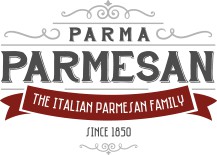No products
Product successfully added to your shopping cart
There are 0 items in your cart. There is 1 item in your cart.PARMIGIANO REGGIANO PARMA PARMESAN IS THE KING OF PARMIGIANO REGGIANO WHICH, IN TURN, IS THE KING OF ALL CHEESES!
The taste of Parmigiano Reggiano is one of a kind and it comes from nine centuries of history. It was born in the fertile Po valley, in devoted farms and dairies, in storage rooms where the slow ageing process creates a unique piece. Parmigiano Reggiano Parma Parmesan is an extraordinary cheese, with a surprising taste and aroma, typical in its structure.

THE LAND
Parmigiano Reggiano is produced exclusively in the province of Parma, Reggio Emilia, Modena and in some areas near Mantova and Bologna, in plains, hills and mountains between the Po and Reno River. Here we find the four thousand farms where the cows are fed only with local fodder. The nutrition of these animals must respect a very strict set of rules that don’t allow the use of ensiled forages and fermented feed.
The milk allocated to the production of Parmigiano Reggiano is continuously inspected in order to maintain and guarantee the quality of an entirely natural product, without any additives or preservatives. It has been like this since the Middle Ages when the Benedictines began to produce and age these large cheese wheels.
From the establishment of our business in 1850, up until today, we have discovered the best grazing lands, the best streams and the best farms for our cows. We have learnt to analyse the geology of the lands and the changing weather conditions throughout the year, the so called microclimate.
These, and many other factors, determine the selection of Parma Parmesan.
HOW THE MILK IS PROCESSED
Every day, the milk of the evening milking is left to rest in large tanks; this way, the fat spontaneously surfaces and is then used for the production of butter.
Very early the following morning, as soon as the whole milk of the morning milking arrives from the farms, it is mixed with the overnight skimmed milk and then poured in the traditional overturned bell-shaped bronze pots.
600 litres of milk are needed to produce one when of Parma Parmesan Parmigiano Reggiano.
Calf rennet is added, together with natural whey, rich in natural lactic starters obtained from the previous day’s milk processing. After about ten minutes the coagulation begins and the curd that forms is broken up in tiny grains through an ancient tool called spino.
At this point, the cooking takes place, reaching a temperature of 55 degrees Celsius. At the end of this process, the grains all fall at the bottom of the pot and merge together, creating one big mass that is then pulled out by the dairyman.
The cheese is then cut in two parts, covered in the traditional canvas and then put into a mould where it acquires its final shape.
This salting process by absorption closes the production cycle and opens the ageing process.

THE AGEING PROCESS
Lasciato riposare su tavole di legno, la parte esterna del formaggio si asciuga formando una crosta naturale, senza trattamenti, perciò perfettamente edibile.
La stagionatura minima è di dodici mesi, ed è solo a quel punto che si potrà dire se ogni singola forma potrà conservare il nome che le è stato impresso all’origine con la tipica marchiatura.
THE MARKING PROCESS
Experts of the Consortium of Parmigiano Reggiano examine each wheel, one by one, with rigour, discipline and accuracy.
Once the inspection takes place and the cheese is verified, the Protected Designation of Origin (PDO) firebrand is applied to the cheese.
The wheels that don’t comply with the PDO requisitions are downgraded and the origin marks are cancelled through a treatment that is carried out on the surface of the crust.
This is the most delicate moment for the producer and the most important for the customer: it is the moment of selection and certification of total guarantee of the product. Once the experts of the Consortium carry out the first inspection, the wheels are checked by our Parma parmesan experts that verify, check and select the best cheeses, after having taken such good care of them throughout the whole ageing process.
Only one out of twenty wheels passes this strict inspection.
One out of twenty means 5% of the overall production.
It is this additional strict inspection and discipline that we carry out since 1850 that allows a wheel of Parmigiano Reggiano to be the proud holder of the Parma Parmesan brand.

HEALTY
Parmigiano Reggiano has no additives or preservatives, it is easy to digest and extremely rich form a nutritional point of view. It’s high content of proteins, vitamins, calcium and mineral salts make this cheese suitable for every age and any situation. A burst of energy for everyone.
PROTECTED
Parmigiano Reggiano is protected by the Consortium but, most of all, loved for its always generous taste for over nine centuries.
The Consortium protects this product that, by now, has a sort of mythical aura, against the large number of imitations all over the world.
Unique in its taste, smell and exquisite craftsmanship, it is always and only made by us, in a surrounding of rivers, plain and hills, in a mild but strong climate, a unique balance between wisdom and passion and the wonders of nature.
